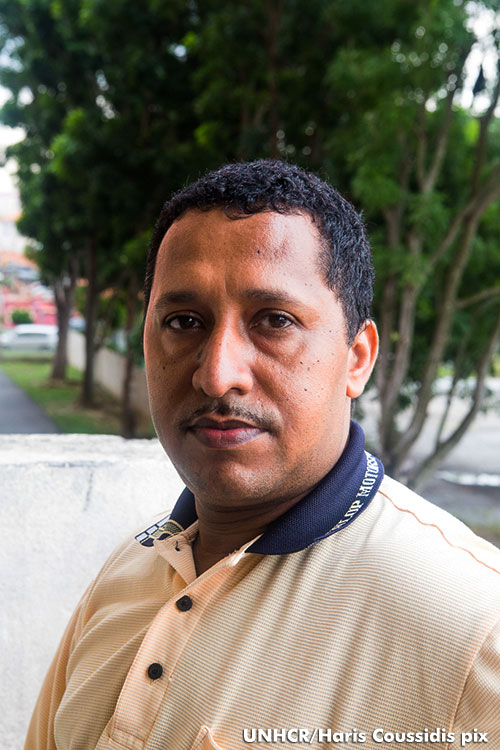Every year, thousands risk their lives on un-seaworthy vessels, hoping to land on safer and more prosperous shores.
There are more than 150,000 refugees registered with the UNHCR, the UN refugee agency, in Malaysia. This, despite the government refusing to sign any international convention recognising the rights of refugees.
In this weekly series for the month of October, we share the stories of the refugees through the one thing that binds us all - food.
Back home in Somalia, Fridays offer the opportunity for a social gathering.
After prayers, the men would extend an invitation for their friends to come over to their house for a meal.
 It usually turns out to be an elaborate feast, and each would take turns to reciprocate the courtesy.
It usually turns out to be an elaborate feast, and each would take turns to reciprocate the courtesy.
In Malaysia, it is not the same for Salahuddin. Living as a refugee, there is no sense of community or belonging, he declares.
People keep to themselves a lot, as a way of protecting themselves. Expense is another big factor. Food is costly and no one can afford the lavish spreads that they were used to back home.
Salahuddin misses these weekly social gatherings and he remembers that whenever his turn came, he would outdo himself in preparing special dishes.
He enjoyed spending time in the company of good friends and the chance to catch up on each other’s news.
Remembering Somalia
Salahuddin has found a way to keep the memory of those times alive in Malaysia by cooking Somali dishes for others.
The Somali community has come to appreciate his cooking and buys his food as a way of also merging memories of home into their daily lives.
Salahuddin laughingly jokes that whatever food he misses, he cooks and that keeps him happy.
Breakfast is the most important meal of the day, he says, lunch the biggest and dinners usually tend to be to be a lighter fare.
As he gets ready to cook lunch in his small kitchen, Salahuddin explains that he likes to keep his dishes simple and true to the principles of Somali cuisine.
He starts preparing baasto , or pasta, with sauce and a meat dish on the side.
He works with great precision and speed, his attention focused as he adds the pasta to the boiling water while stirring the vegetables in the sauce and seasoning the meat.
A proper meal, with bananas
Back in Somalia, where he worked as a cook, he developed his culinary skills by starting with simple meals and gradually evolving to more elaborate dishes.
He is so used to cooking both for himself and others that he could do it with his eyes closed.
At last, the pasta is drained and perfectly ‘ al dente ’ (firm to the bite) and the vegetables in the sauce have a certain crunchiness that give it a nice texture.
As he sets the table, Salahuddin puts a plate of papaya and banana salad, with a couple of peeled bananas on the side.
Banana is an important staple in the Somali diet. It is eaten with every meal and not as a snack. A meal without a banana is an incomplete meal.
The actual reason is that it provides a counterbalance to the spiciness of the chilli dipping sauce, whilst adding a slight sweetness to the overall flavours. The combination works quite well.
Salahuddin places a bottle of a sweet soft drink on the table and happily exclaims: “ Ha is martiyeen ”, and invites us to sit and eat.
“Don’t feel like you are a guest. Don’t be shy. Come and eat with me!”
Suqaar - Fried beef with potatoes
This beef recipe is a favourite Somali dish that is easy to make.
The meat and vegetables are cut into small cubes, cooked slowly to form a nice gravy sauce, and sprinkled with freshly chopped coriander. Serve with basmati rice or warm anjero bread.
Serves 4
Ingredients
750g beef blade
1 tsp salt
3 tbsp olive oil
1 medium onion, thinly sliced
2 large carrots, peeled and cut into 2cm cubes
2 medium potatoes, peeled and cut into 2cm cubes
1 tsp salt
1 cup fresh coriander, roughly chopped
Method
1. Fill a medium pot to half way with water and bring to a boil. Add the meat and salt and boil over medium heat for 20 minutes - the meat will not be cooked through completely at this stage.
Remove the meat from the water, cool to room temperature and cut into 2cm cubes. Reserve ¾ cup of the cooking liquid.
2. In a large frying pan, heat the oil over a medium heat and fry the onions for a couple of minutes, until soft.
Add the carrots and potatoes and fry for 10 – 15 minutes stirring occasionally, until the vegetables are soft.
Add the meat and salt and cook for 5 minutes, stirring occasionally, until it is browned.
Add the reserved liquid, simmer for 3 - 5 minutes until you have a thick sauce.
3. Remove from the heat, sprinkle the chopped coriander, stir everything well and transfer onto a serving dish.
Serve with rice or anjero bread on the side and some chilli dipping sauce.
Over the last year, HARIS COUSSIDIS worked with 17 refugee home cooks, representing 11 countries (Somalia, Ethiopia, Sudan, Palestine, Syria, Iraq, Iran, Afghanistan, Pakistan, Sri Lanka and Myanmar) to produce and test 55 family recipes, to form the foundation of the cookbook ‘A Taste From Home’.
‘A Taste From Home’ is available at RM60 only at UNHCR, and will soon be made available for sale at selected bookstores. Contact UNHCR at 03-2118 4986 or email: [email protected] for a copy.
All proceeds will go towards the welfare and medical emergency assistance for refugees in Malaysia.

